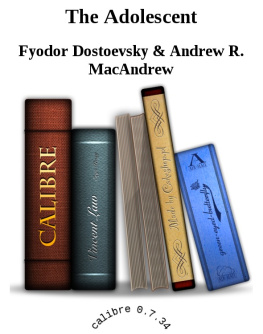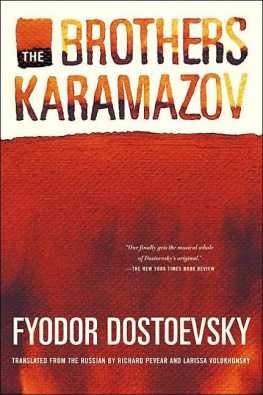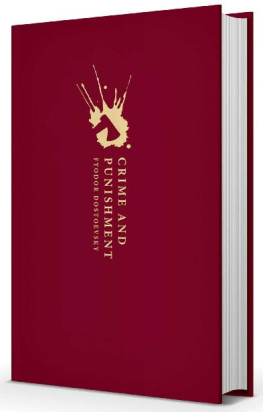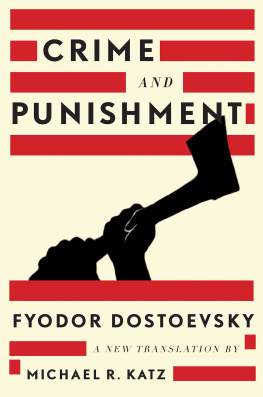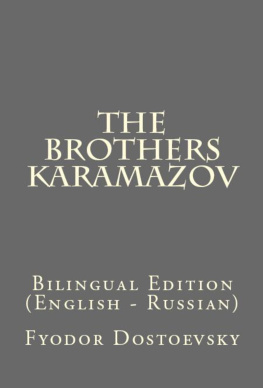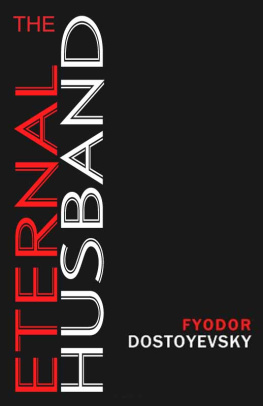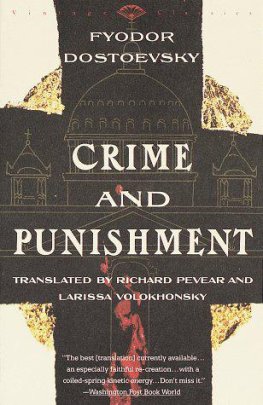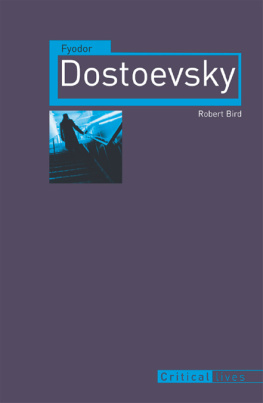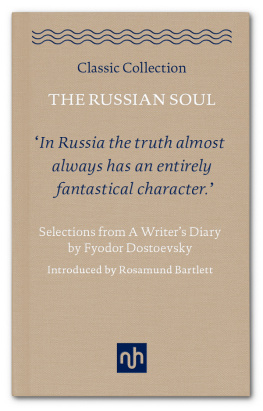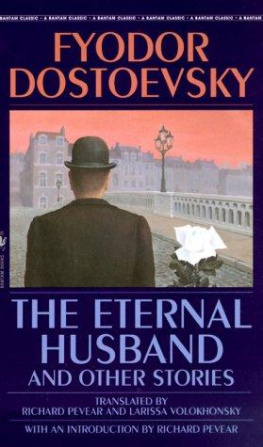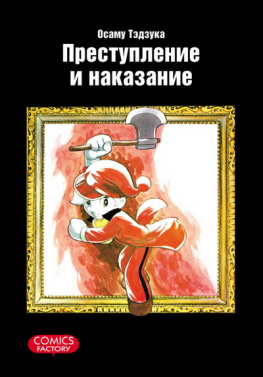Table of Contents
THE ADOLESCENT
Fyodor Dostoevsky
A NEW TRANSLATION BY
Andrew R. MacAndrew
Copyright 1971 by Andrew MacAndrew
First Edition
INTRODUCTION
The great, all-pervading theme of Dostoevsky's five major novels is man's need for God. Without God, the fragile harmony between man and the outside world collapses, and he becomes a bundle of turmoil surrounded by chaos. This is what Dostoevsky calls disorder, and "Disorder" was his original choice for the title of his fourth major novel, which he finally called PodrostokThe Adolescent. Actually it is the story of a nineteen-year-old searching for identity amidst the disorder of Russian society of the 1870s. To Dostoevsky, that society was disintegrating as the "unifying idea"Godbecame more and more deeply undermined. The dogma of the Russian Orthodox Church, the tsar's autocracy, the rigid social hierarchy, and the absolute loyalty to Russiaall these, along with other time-tested institutions and values, were being coldly examined, questioned as to their usefulness, and increasingly challenged. The very foundations of life, as Dostoevsky saw it, were being thereby shaken loose and the whole structure was beginning to sway underfoot. Those old enough to have been raised before the disorder set in still managed somehow to maintain their footing by sheer habit. But the young stumbled, fell, and tried desperately to discover new ways of keeping their balance. Many of them, however, were only too willing to crawl and scatter in search of the nearest cracks and holes to take refuge in dank darkness.
The metaphysical and social landscape in The Adolescent (1874) is essentially the same as in Crime and Punishment (1866), The Idiot (1868), The Possessed (1872), and The Brothers Karamazov (1880), although its political overtones may well be, as has often been pointed out, less virulent than in its immediate predecessor, The Possessed. But whatever variations in emphasis there may be among these books, they are minor in comparison with the palpable ideological difference between Dostoevsky's late major works and his earlier writings. The dividing line, of course, appears to be his Siberian detention and exile, although the break is by no means as abrupt as it is usually presented.
To understand the motivations of the characters in The Adolescent (as in any of its sister novels), one must follow the evolution of Do-stoevsky's ideology from the 1840s through the 1870s, keeping a particularly close eye on its shifts and fluctuations relative to the changing intellectual climate in Russia. Ideology played an exceptionally important part in Dostoevsky's own motivation as well as in that of his characters, and he peopled his books with characters who were moved by ideas that, at one time or another in his own ideological evolution, may have commanded his allegiance (enthusiastic or grudged) or his opposition (fanatical, understanding, or even sympathetic). And so, like Dostoevsky himself, all his important characters, consciously or unconsciously, are affected by the ideas floating in the air, blown in, as a rule, from the West, ideas that Dostoevsky sometimes compared to intelligent bacteria. In his later works, these bacteria are a source of dangerous infection, a sort of "rationalitis," to which only those with solid roots in their native, Russian soil are immune.
The setting of every major Dostoevsky novel is Russia at a given stage of ideological infection, from which some characters perish while others, with sufficient immunity, survive to continue their search for salvation.
Dostoevsky's method is like that of a scientist who studies the capacity of an environment to sustain life by watching the changes in the organisms that inhabit it, or, to put it in what might be more Do-stoevskian language, it is by looking into man's soul that Dostoevsky searches for God. To Dostoevsky, everything in the final analysis depends upon man's relation to God, which, in his own case, was always emotional and tense, albeit unsteady and fluctuating.
In The Adolescent, for instance, it is easy to see how Dostoevsky's own intellectual history is reflected in the two most important characters. Versilov, "a man of the forties," which was Dostoevsky's generation, stumbles upon the same ideas that Dostoevsky had stumbled upon at the time, reasons along much the same lines that Dostoevsky had once reasoned along, and gropes desperately for a faith or a substitute faith, just as Dostoevsky had apparently groped himself. On the other hand, Versilov's illegitimate son, the narrator, is partly an autobiographical transplant of the dreamy, romantic young Dostoevsky of the early 1840s (reminiscent of the narrator in White Nights) into the 1860s and 1870s, a projection that enables the author to look at the new generationthe nihiliststhrough the eyes of their young contemporary.
Before looking into the private circumstances of Dostoevsky's life that may have made him receptive or antagonistic to certain ideas at certain times, one must grasp which ideas were prevalent at what moment on the Russian intellectual scene during Dostoevsky's writing career, i.e., roughly between 1840 and 1880.
The most readily available food for thought throughout the 1840s may be described generically as French social Utopianism.* Although made up of such heterogeneous elements as eighteenth-century rationalism, romanticism, and the neo-Catholic mysticism of the Restoration, these nineteenth-century adaptations of Thomas More's sixteenth-century Utopian prototype all share one striking characteristica peculiar form of mystical humanism based on the refusal to condone human suffering, combined with an attempt to establish a religious foundation for that position in the Gospels. Like Jean-Jacques Rousseau, the Utopians held that, being of divine essence, man is good by nature. To them, evil was incompatible with the will of God, and the notion of original sin made no sense in view of God's infinite mercy.
Logical inconsistencies such as these were, in the Utopians' view, flagrant perversions of the original teachings handed down by Christ, distortions introduced by men corrupted by life in their wretchedly organized society, which they called "civilization." If asked how a society made up of naturally good men could be so evil, the Utopians had a ready answer: by accident.
* Although the brand of Utopianism that reached Russia was distinctly French, it contained easily recognizable elements from Schelling's Naturphilosophie and Hegel's Phanomenologie, both works that were popularized in France by Victor Cousin and that had also reached Russia independently at an earlier date. The first Russian contact with Utopian thought was mostly secondhand, through French novels read either in the original or in translated installments carried by half a dozen literary periodicals. The most popular of the French writers were Victor Hugo, Balzac, George Sand, and also Eugene Sue, whose romans-feuilletons, beside being inspired by Utopian ideas, also had considerable influence on Dostoevsky's plot construction. Of the more directly theoretical works that were read and discussed in Russia, the most important were Saint-Simon's Nouveau Christianisme (1819), Lamennais's Paroles d'un croyant (1834), and Etienne Cabet's Voyage en Icarie (1834). As for Charles Fourier, whose Utopian, cooperative-like phalansteries are the most often mentioned by and in connection with Dostoevsky, his theories were known in Russia mainly through his disciple, Victor Considerant ( La Destinee sociale, 1834), a much more readable writer from whom Dostoevsky borrowed many ideas und even whole passages (e.g., the vision of the Golden Age).

